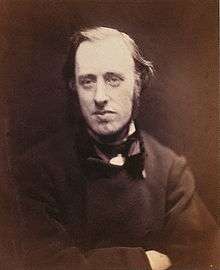
William Edward Hartpole Lecky
William Edward Hartpole Lecky (26 March 1838 – 22 October 1903) was an Irish historian and political theorist.
Quotes
- Whence has come thy lasting power.
- On an old Song. Reported in Bartlett's Familiar Quotations, 10th ed. (1919).
- The stately ship is seen no more,
The fragile skiff attains the shore;
And while the great and wise decay,
And all their trophies pass away,
Some sudden thought, some careless rhyme,
Still floats above the wrecks of Time.- On an old Song. Reported in Bartlett's Familiar Quotations, 10th ed. (1919).
- Terror is everywhere the beginning of religion.
- History of the Rise and Influence of the Spirit of Rationalism in Europe (1910)
- The great difficulty of Christianity is that many of the Bible revelations seem to clash with our sense of justice and right.
- The Religious Tendencies of the Age(1860)
A History of European Morals from Augustus to Charlemagne (1869)
- At one time the benevolent affections embrace merely the family, soon the circle expanding includes first a class, then a nation, then a coalition of nations, then all humanity, and finally, its influence is felt in the dealings of man with the animal world. In each of these stages a standard is formed, different from that of the preceding stage, but in each case the same tendency is recognised as virtue.
- Chapter 1 (2nd edition, Vol. 1, London: Longmans, 1869, p. 103)
- It is abundantly evident, both from history and from present experience, that the instinctive shock, or natural feeling of disgust, caused by the sight of the sufferings of men is not generically different from that which is caused by the sight of the sufferings of animals.
- Chapter 2 (2nd edition, Vol. 1, London: Longmans, 1869, p. 294)
- There can indeed be little doubt that for nearly two hundred years after its establishment in Europe, the Christian community exhibited a moral purity which, if it has been equaled, has never for any long period been surpassed. Completely separated from the Roman world that was around them, abstaining alike from political life, from appeals to the tribunals, and from military occupations; looking forward continually to the immediate advent of their Master, and the destruction of the Empire in which they dwelt, and animated by all the fervor of a young religion, the Christiana found within themselves a whole order of ideas and feelings sufficiently powerful to guard them from the contamination of their age.
- Chapter 4 (3rd edition p. 11)
- Under these circumstances, there has arisen in society a figure which is certainly the most mournful, and in some respects the most awful, upon which the eye of the moralist can dwell. That unhappy being whose very name is a shame to speak; who counterfeits with a cold heart the transports of affection, and submits herself as the passive instrument of lust; who is scorned and insulted as the vilest of her sex, and doomed, for the most part, to disease and abject wretchedness and an early death, appears in every age as the perpetual symbol of the degradation and sinfulness of man. Herself the supreme type of vice, she is ultimately the most efficient guardian of virtue. But for her, the unchallenged purity of countless happy homes would be polluted, and not a few who, in the pride of their untempted chastity, think of her with an indignant shudder, would have known the agony of remorse and of despair. On that one degraded and ignoble form are concentrated the passions that might have filled the world with shame. She remains, while creeds and civilisations rise and fall, the eternal priestess of humanity, blasted for the sins of the people.
- Chapter 5 (3rd edition pages 282-283).
- Referring to the figure of the prostitute.
- In looking back, with our present experience, we are driven to the melancholy conclusion that, instead of diminishing the number of wars, ecclesiastical influence has actually and very seriously increased it. We may look in vain for any period since Constantine, in which the clergy, as a body, exerted themselves to repress the military spirit, or to prevent or abridge a particular war, with an energy at all comparable to that which they displayed in stimulating the fanaticism of the crusaders, in producing the atrocious massacre of the Albigenses, in embittering the religious contests that followed the Reformation.
- Chapter 5 (3rd edition p. 254)
- There have certainly been many periods in history when virtue was more rare than under the Caesars; but there has probably never been a period when vice was more extravagant or uncontrolled.
- Chapter 5 (3rd edition p. 303)
External links
This article is issued from
Wikiquote.
The text is licensed under Creative
Commons - Attribution - Sharealike.
Additional terms may apply for the media files.